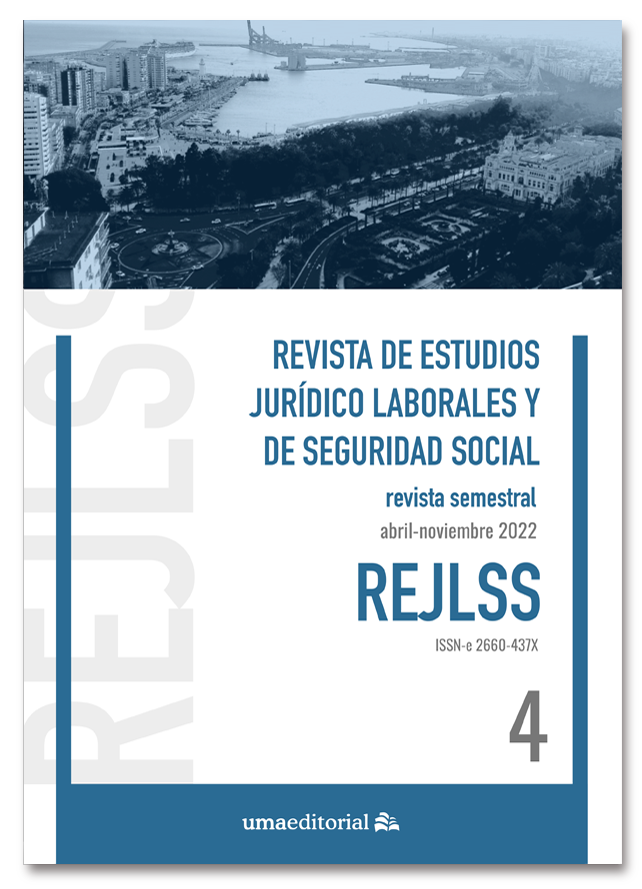Recognition of Permanent Disability after Early Retirement Due to Disability
STC 172/2021 of October 7
DOI:
https://doi.org/10.24310/rejlss.vi4.14057Keywords:
Disability, discrimination, permanent disability, early retirementAbstract
The comment on the doctrine emanating from the Constitutional Court is addressed in STC 172/2021 of October 7, 2021 that revokes the one maintained by the Supreme Court that made it impossible to access Permanent Disability to people with disabilities who retired early ex art. 206.2 of the General Law of Social Security. The recognition of the great invalidity due to violation of article 14 CE derived —maintains the appellant— of a discriminatory interpretation of the norm in the seat of appeal and cassation is demanded in protection. Both the merits of the matter and the procedural interim invite analysis from the perspective of relational justice, for which we analyze the gaps in justice that occur in the dimensions of reciprocity (facts), institutionality (legality) and sociality (context).
Downloads
Metrics
Publication Facts
Reviewer profiles N/A
Author statements
Indexed in
-
—
- Academic society
- N/A
- Publisher
- Universidad de Málaga. UMA Editorial
References
AA. VV. (Márquez Prieto, A. Coord.), Justicia Relacional y Principio de Fraternidad, Thomson-Aranzadi, Cizur Menor (Navarra), 2017.
Márquez Prieto, A., Repensar la Justicia Social. Enfoque Relacional. Teoría de Juegos y Relaciones Laborales en la empresa, Thomson-Aranzadi, Cizur-Menor (Navarra), 2008.
Márquez Prieto, A., “La cuantía de las prestaciones por desempleo y la reducción de jornada por guarda legal (SSTS de 2 de noviembre de 2004)”, Revista de derecho de la seguridad social. Laborum Nº. Extra 1 (In memoriam a don Aurelio Desdentado Bonete), 2021.
Naranjo Román, R., El recurso de amparo: la especial trascendencia constitucional en la jurisprudencia del Tribunal Constitucional, Tirant lo Blanch, Valencia, 2020.
Bobbio, N., Igualdad y libertad, Paidós I.C.E./U.A.B., Barcelona, 1993.
Rodríguez Piñero M. y Fernández López, M. F., Igualdad y discriminación, Tecnos, Madrid, 1985.
Downloads
Published
How to Cite
Issue
Section
License
In the Revista de Estudios Juridico Laborales y de Seguridad Social (REJLSS) we are clearly committed to a policy of open access to scientific knowledge (See Berlin Declaration).
Those authors who have publications with this journal accept the following terms:
This journal provides immediate free access to its content under the principle of making research freely available to the public. All the contents published in the REJLSS are subject to the Creative Commons license
Attribution-NonCommercial-NoDerivatives 4.0 International (CC BY-NC-ND 4.0)
Copyrights are of two kinds: moral and patrimonial. Moral rights are perpetual, inalienable, non-transferable, inalienable, unattachable and imprescriptible prerogatives. In accordance with Spanish copyright legislation, the authors who publish in REJLSS retain the moral right over their work, as well as the ownership of the patrimonial right, which will be transferred to the University of Malaga for its dissemination in open access.
The patrimonial rights, refer to the benefits that are obtained by the use or disclosure of the works. REJLSS is published in open access and is exclusively authorized to perform or authorize by any means the use, distribution, dissemination, reproduction, adaptation, translation or transformation of the work.
It is the responsibility of the authors to obtain the necessary permissions of the images that are subject to copyright.
Authors whose contributions are accepted for publication in this journal retain the non-exclusive right to use their contributions for academic, research and educational purposes, including self-archiving or depositing in open access repositories of any kind.
The electronic edition of this magazine is edited by the Editorial of the University of Malaga (UmaEditorial), being necessary to cite the origin in any partial or total reproduction.
The authors may adopt other non-exclusive license agreements for the distribution of the version of the published work (eg: deposit it in an institutional telematic archive or publish it in a monographic volume) provided that the initial publication is indicated in this magazine.
Authors are allowed and recommended to disseminate their work through the Internet (eg, in institutional telematic archives or on their website) before and during the submission process, which can produce interesting exchanges and increase citations of the published work.







19.png)
